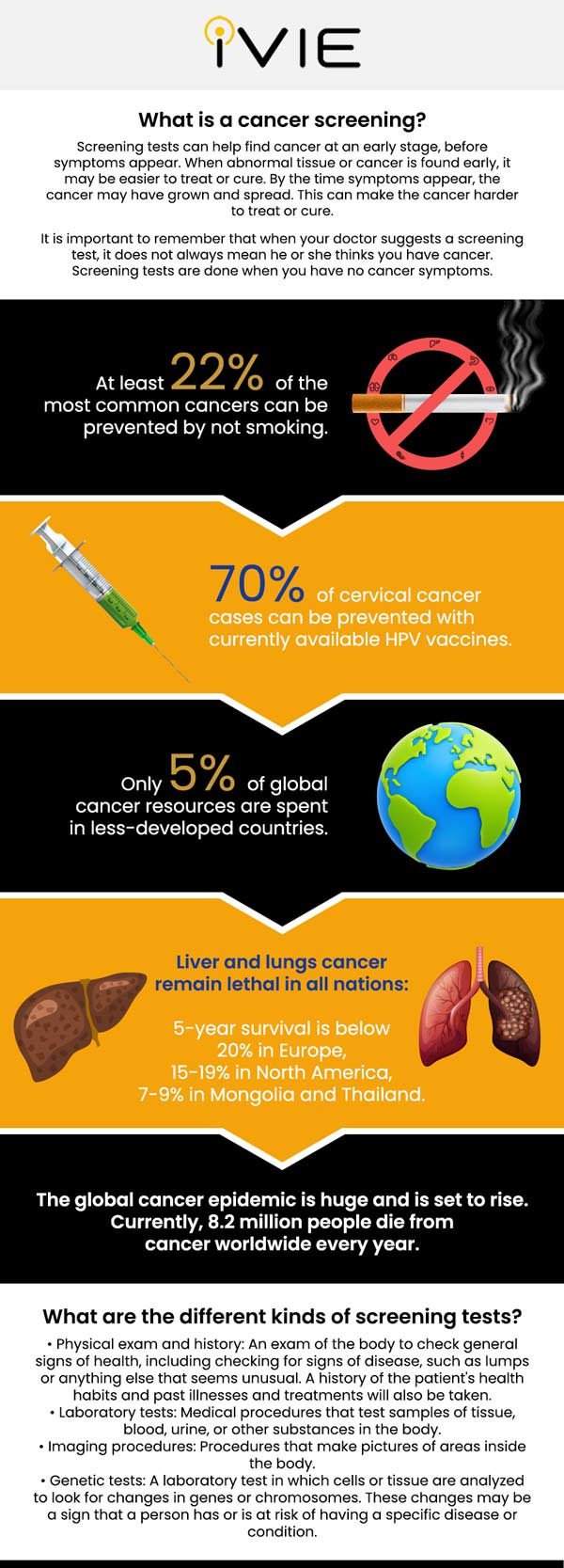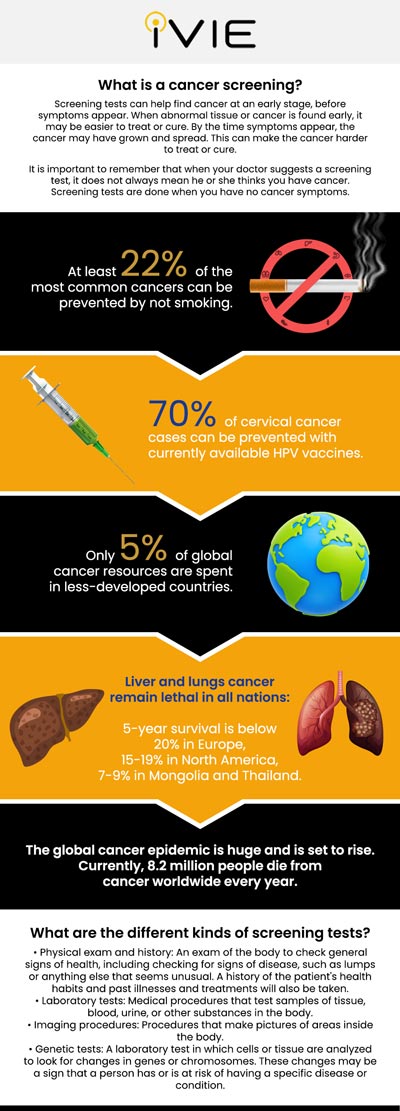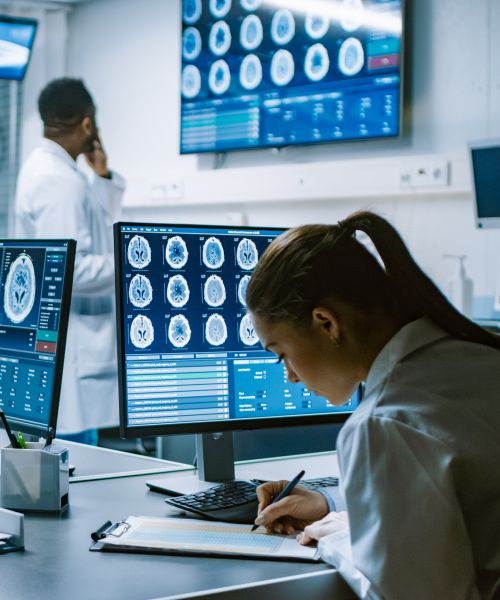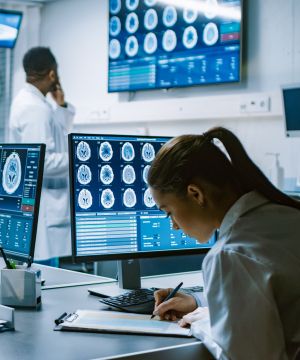MRI for Cancer Screening in Culver City Los Angeles, CA
To detect cancer early, doctors use a combination of approaches – physical exams, blood tests, imaging scans, and even genetic tests in some cases. A patient’s specific tests depend on their unique risk factors and potential health concerns. Meet Dr. Kourosh Naini and get your cancer screening at iVIE. For more information, contact us or book an appointment online. We are located at 11600 Washington Pl, Suit 104A, Culver City, CA 90066.




Table of Contents:
What are cancer screening tests?
What is more effective at detecting cancer a CT scan or an MRI?
Is an MRI capable of detecting cancer anywhere in the body?
How does cancer appear on an MRI?
Cancer screening tests are a broad category of testing services used to identify early signs of cancer before a patient shows symptoms. Detecting cancer at these early stages makes it much easier to treat.
While these tests do not diagnose cancer, they can identify signs that suggest cancer might be present, leading to further diagnostic procedures. Individuals may be recommended for such tests if they are at a higher risk for cancer due to health and lifestyle factors, family history, and other considerations.
Generally, these screening tests are performed starting in an individual’s 40s. Cancer screening involves a combination of physical examinations, laboratory tests, imaging tests, and genetic tests.
The specific concerns and potential risks of each patient determine the most appropriate tests. Common cancer screenings include tests for prostate cancer, breast cancer, cervical cancer, colon cancer, ovarian cancer, and colorectal cancer.
These tests help detect unusual changes in the body that could indicate the onset of cancer, allowing for early intervention and regular follow-up monitoring.
The best imaging test for detecting cancer can vary depending on the type of cancer and the area of the body affected. In some cases, MRIs are more effective than CT scans for detecting certain types of cancer.
MRIs can image certain tissues that CT scans may not capture as well, such as those in the prostate, liver, and uterus. CT scans, on the other hand, are often preferred for providing detailed images of the lungs or colon and can detect cancers in the liver, spleen, gallbladder, bladder, and kidneys.
In certain scenarios, both MRI and CT scans may be recommended to provide a comprehensive view of the body. Both imaging techniques offer high-quality images, and using them together can provide a thorough internal view for cancer detection.
MRIs are particularly useful for monitoring treatment effectiveness, investigating how deeply tumors have grown into body tissues, and detecting remaining tissues after treatment.
MRIs are effective at detecting many types of cancer throughout the body due to their ability to create detailed images of soft tissues. However, MRIs are not capable of detecting all types of cancer or cancer anywhere in the body. They are particularly useful for visualizing tumors in the brain, breast, spine, bladder, lung, pancreas, liver, and prostate.
The detailed images provided by MRIs are created using radio waves and magnets, which allow doctors to examine soft tissues more closely than other imaging methods.
Despite their effectiveness, MRIs can sometimes miss small tumors or produce unclear images, resulting in false negatives. Additionally, MRIs do not produce clear images of bone matter, making them less ideal for detecting bone cancer.
Blood cancers like leukemia also do not typically form tumors, so MRIs are not usually the preferred test for these types of cancers. However, MRIs can still provide valuable information, such as detecting swelling in organs like the liver and spleen caused by blood cancers.
On an MRI, cancerous tissues typically appear as white or very light masses against the black-and-white background of the scan. This contrast makes tumors stand out, allowing for easier identification.
In some cases, providers will administer a contrast dye before the MRI, which helps cancerous tissues show up more brightly on the images. Cancer can appear as an abnormally enhancing mass beyond what is often visible through the use of different imaging tests.
These detailed images from multiple angles offer a comprehensive view of the body’s internal tissues. This can be invaluable in determining the location and size of a tumor, aiding in the diagnosis and scope measurement of cancer.
It also helps monitor the success of treatment interventions, making MRIs a critical tool in managing and treating cancer. However, it is important to note that MRIs are usually part of a broader diagnostic process that may include other imaging tests, biopsies, endoscopies, urinalysis, blood tests, and genetic tests.
MRI cancer screening is available at iVIE. For more information, contact us or book an appointment online. We are located at 11600 Washington Pl, Suit 104A, Culver City, CA 90066. We serve patients from Culver City Los Angeles CA, Downtown LA, Beverly Hills CA, Marina del Rey CA, Venice CA, Santa Monica CA, and surrounding areas.
Check Out Our 5 Star Reviews



Additional Services You May Need
▸ Dementia Screening
▸ Aneurysm Screening
▸ Spine MRI
▸ Whole Body MRI Screening
▸ MRI Brain Screening
▸ Brain PET
▸ Work/Sport Spine Injury Diagnosis
▸ Work/Sport Brain Injury Diagnosis
▸ Whole Body PET For Cancer
▸ MRA Brain Screening


